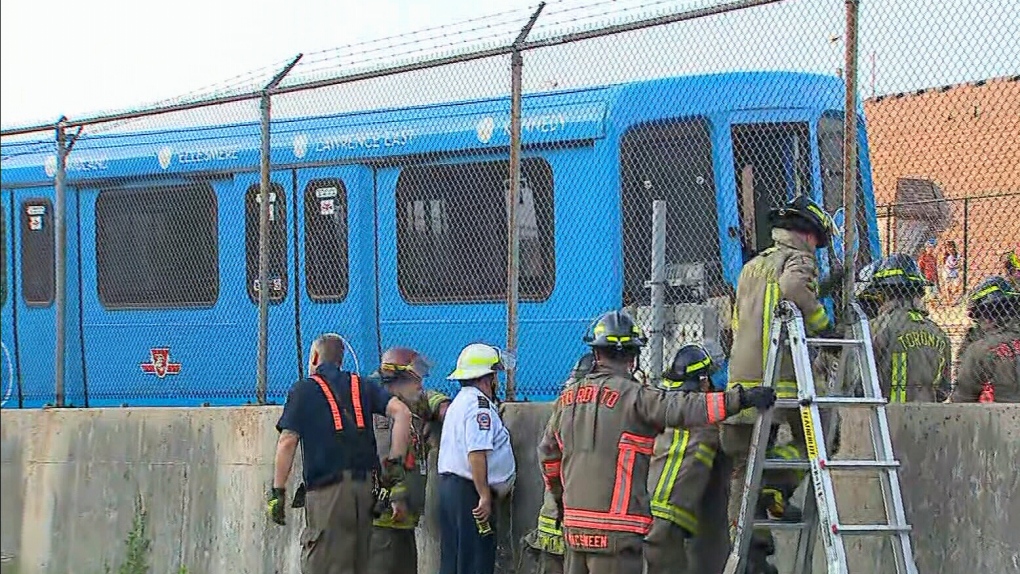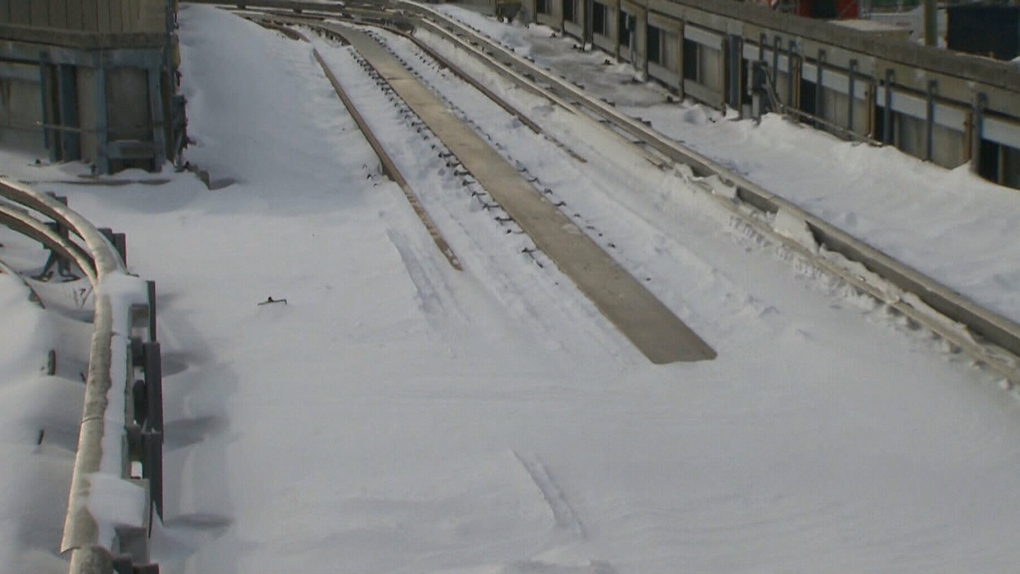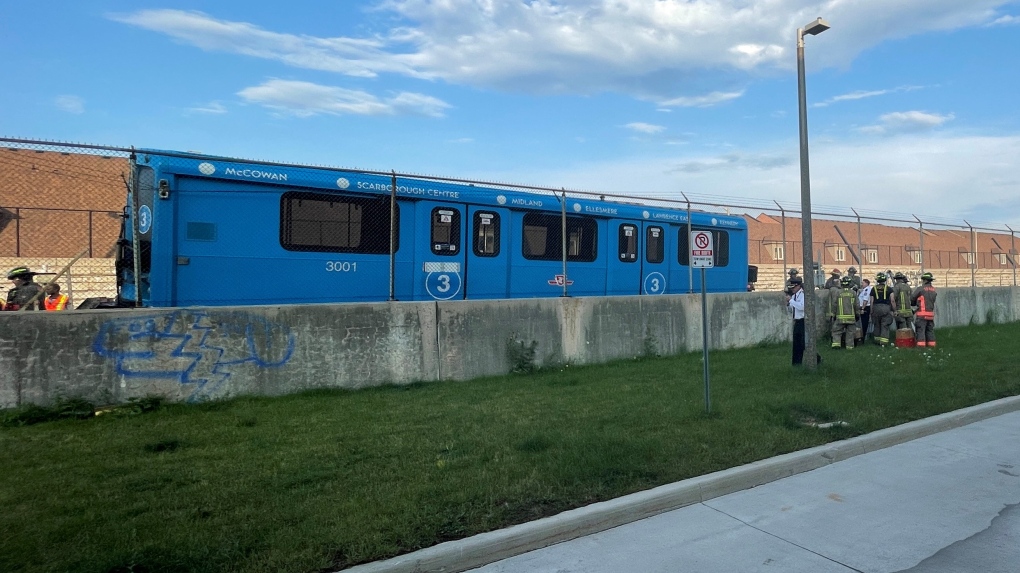The Scarborough RT was supposed to be replaced years ago. Here why it's still running
With just months to go before the Scarborough RT is decommissioned, the TTC has temporarily shut down service on the line following a train derailment on Monday night that left five people injured.
This incident could be the final nail in the coffin for the aging six-stop transit line, which opened in 1985 and was scheduled to be shut down for good in November.
Why has the city kept the SRT (Line 3) running?
The SRT vehicles were only designed to run for 25 years and should have been retired more than a decade ago. Politicians have spent the better part of 20 years debating what should replace the SRT and in the interim, the city has kept Line 3 in operation well past its intended lifespan.
In a 2006 report, city staff recommended that council spend $360 million to upgrade the line and purchase larger, new-generation vehicles to replace the SRT’s aging fleet of 28 cars.
“It is expected that the aging vehicles will result in progressively-deteriorating service reliability over the coming years,” the report warned.
At that time, city staff advised council to “develop a plan for replacing the existing vehicles, and expanding capacity in the Scarborough RT corridor, before the current fleet reaches the end of its useful service life.”
In 2007, one year after the report was released, the plan to upgrade the line with new vehicles was scrapped following the approval of Transit City, which would have seen the Scarborough RT converted to a seven-stop light rail line that would extend to Malvern.
But following his election in 2010, former Toronto mayor Rob Ford cancelled the fully funded Transit City plan, proposing to replace the SRT with an extension of the Bloor–Danforth subway line. At the time, Ford’s subway was estimated to cost $3.65 billion and was unfunded by other levels of government. City council ultimately voted in favour of Ford’s plan.
Although John Tory vowed to move ahead with the Scarborough subway after he was elected mayor in 2014, the debate raged on at city hall for years, as many councillors continued to make a case for the LRT, which could be built much faster and came with a significantly cheaper price tag. What was once envisioned as a three-stop subway was scaled back to one stop and construction costs continued to balloon.
In 2019, Ontario Premier Doug Ford committed more than $11 billion in funding to four major Toronto transit projects, including the Scarborough subway. After uploading the projects to the province, Ford switched the Scarborough subway back to three stops. The timeline for when the subway would open was later pushed from 2026 to 2030.
On Tuesday, when asked about the train derailment and the delay in building the Scarborough subway, Ford blamed the previous provincial Liberal government, which had provided funding to the city for the planned LRT project.
 “We had approval from the federal government to build the Scarborough subway. It would have been built by now led by my brother Rob. It was shot down by the provincial government,” said Ford, who previously served as a Toronto city councillor during his brother’s tenure as mayor.
“We had approval from the federal government to build the Scarborough subway. It would have been built by now led by my brother Rob. It was shot down by the provincial government,” said Ford, who previously served as a Toronto city councillor during his brother’s tenure as mayor.
“We have shovels in the ground and they are tunneling now. So this could have been done many, many years ago if the province had stepped up and supported us. We had the funding, we had council approval, and we had federal approval.”
As predicted in the 2006 report, SRT vehicles have become more and more unreliable with each passing year.
What has the city done to upgrade the aging SRT?
In an effort to extend the lifespan of the vehicles, the TTC undertook two significant system overhauls to keep the line running. The first overhaul of SRT vehicles was initiated in 2012 to make sure the line was in good shape for the Pan Am Games in Toronto in 2015. This involved some cosmetic upgrades, including improvements to the interior of the vehicles and the addition of a blue vinyl wrap to the exterior of the cars.
A second overhaul program began in 2018 and included routine state of good repair activities, major car body structural repairs, HVAC system upgrades, and an upgrade to pre-boarding announcement systems.
The city had considered a third overhaul to keep the SRT running past 2023, but when the timeline for the new subway extension was pushed back, councillors decided to scrap the SRT in favour of buses.
According to the TTC, to keep the SRT running safely until 2030, it would cost an estimated $520 million, and that would “not guarantee reliable service.”
The SRT hasn't been a reliable mode of transportation in Toronto for years. Only two stops on the line are accessible and in a 2021 report, city staff acknowledged that SRT vehicles were “becoming increasingly more difficult to maintain.”
The report indicated that in September 2020, the number of SRT trains in service was temporarily reduced to three for several weeks due to “concerns with a critical bearing in the truck assembly.”
SRT service is also regularly disrupted by inclement weather.
 Snow covers the tracks of the Scarborough RT light rail line on Jan. 31, 2019. The line has been out of service for days. (CTV Toronto)“During the hot summer weather, the SRT propulsion equipment tends to overheat, culminating in propulsion system shut-down. Consequently, speed restrictions are implemented to ensure the propulsion equipment operates within tolerable limits. There have been 70 days where speed restrictions were implemented in 2020,” the report continued.
Snow covers the tracks of the Scarborough RT light rail line on Jan. 31, 2019. The line has been out of service for days. (CTV Toronto)“During the hot summer weather, the SRT propulsion equipment tends to overheat, culminating in propulsion system shut-down. Consequently, speed restrictions are implemented to ensure the propulsion equipment operates within tolerable limits. There have been 70 days where speed restrictions were implemented in 2020,” the report continued.
“During the extreme winter months, snow and ice also affects the operation of SRT with the system being suspended for 6 days in 2018 and 2019.”
Staff said that between 2018 and 2020, there were 184 incidents related to obsolete propulsion, braking, or battery systems.
The report states that 158 of those incidents resulted in delays greater than or equal to five minutes.
Shelagh Pizey-Allen, a spokesperson for the transit advocacy group TTCRiders, said while the cause of Monday’s night’s derailment is still unknown, it should serve as a “wakeup call” to the city.
“No one is blameless; city staff, all levels of government, all political parties have had a hand in this situation where the RT is no longer reliable and there is no rapid transit replacement ready,” she told CP24.com on Tuesday.
“The provincial and federal governments are investing tens of billions of dollars in new transit lines and yet this kind of incident happens where we are questioning the investment in maintenance but also safety protocols.”
She said transit riders are “shaken” by the derailment, adding that the incident has brought back memories of the Russell Hill subway accident on Line 1, which left three people dead in 1995.
“That’s what prompted the TTC to create a state of good repair program,” Pizey-Allen said, noting that the TTC has “a massive state of good repair backlog.”
“This needs to be a wake-up call that we have to prioritize maintaining our existing system.”
 A train in Scarborough derailed on Monday, July 24, 2023 (CTV News Toronto/ Corey Baird). Shortly after the derailment on Monday night, TTC CEO Rick Leary ordered an “immediate review” of the cause and the circumstances leading up to the incident.
A train in Scarborough derailed on Monday, July 24, 2023 (CTV News Toronto/ Corey Baird). Shortly after the derailment on Monday night, TTC CEO Rick Leary ordered an “immediate review” of the cause and the circumstances leading up to the incident.
“One thing that we need right now is answers about how this could have happened and how the TTC will make sure it never happens again,” Pizey- Allen said.
She added that council’s recent decision to cancel a request for proposals (RFP) for new vehicles on Line 2 is concerning.
“It is like history repeating itself. Cancelling an order for new vehicles. Is Line 2 going to become the new Scarborough RT where they never made the investment when they needed to in new vehicles and it will get overhauled and overhauled? It’s not acceptable,” she said.
What happens now?
A number of shuttle buses are currently replacing service along the line until the TTC decides what to do next.
The last day of operation for the SRT was scheduled for Nov. 18 and in June, TTC staff could be seen posting signage at all stations warning of the impending closure. Monday night’s derailment could mean that the TTC will halt service on the SRT ahead of schedule.
“It is very much on the table,” TTC spokesperson Stuart Green told CP24 on Tuesday.
“If we don’t believe it is safe to restart train service, we would not restart it. We are having this conversation internally about whether or not we just leave it shut down.”
Green said it is not an “ideal” situation as plans were in place to facilitate a smooth transition to buses in the fall, including priority traffic signal upgrades.
Pizey-Allen said some of the work that needs to be done ahead of the SRT closure can’t be completed overnight.
The TTC has said it plans to run 70 buses an hour along the route during rush hour to replace SRT service when the line is decommissioned but to accommodate the extra buses, a bus bay must be constructed.
“They have to rip up the parking lot at Kennedy Station that’s becoming a bus bay,” Pizey-Allen said. “I don’t even know if the concrete has been poured. It’s not ready to go.”
She said there are some things that can be done right away to improve transit in the area.
“One thing that the provincial government can do right now is make it free to transfer between the GO and the TTC network. At least that would unlock some more transit options within Scarborough,” she said.
“The other thing that could happen is that the TTC could speed up the installation of red bus-only lanes. They have been approved.”
The TTC is expected to continue design work on a dedicated busway that would operate on the existing SRT Line, a project that could improve travel times for commuters by an estimated 10 minutes. Toronto Mayor Olivia Chow has vowed to build the busway despite the fact that the city is facing a $59-million funding shortfall for the project. The busway could be ready for service as early as the winter of 2025, according to the TTC.
“The shutdown down of the RT was going to be a disaster already,” Pizey- Allen said.
“There have been service reductions across the TTC, including Scarborough bus service. So if Scarborough residents are going to be stuck on buses even earlier than planned, the real priority needs to be reversing service cuts and prioritizing buses all across Scarborough with their own lanes.”
CTVNews.ca Top Stories

'She will not be missed': Trump on Freeland's departure from cabinet
As Canadians watched a day of considerable political turmoil for Prime Minister Justin Trudeau and his government given the sudden departure of Chrystia Freeland on Monday, it appears that U.S. president-elect Donald Trump was also watching it unfold.
Canadian government to make border security announcement today: sources
The federal government will make an announcement on new border security measures after question today, CTV News has learned.
Two employees charged in death of assisted care resident who ended up locked outside building overnight
Two employees at an Oshawa assisted living facility are facing charges in connection with the death of a resident who wandered outside the building during the winter and ended up locked outside all night.
The Canada Post strike is over, but it will take time to get back to normal, says spokesperson
Canada Post workers are back on the job after a gruelling four-week strike that halted deliveries across the country, but it could take time before operations are back to normal.
Lion Electric to file for creditor protection
Lion Electric, a Quebec-based manufacturer of electric buses and trucks, says that it plans to file for creditor protection.
Canada's inflation rate down a tick to 1.9% in November
Inflation edged down slightly to 1.9 per cent in November as price growth continued to stabilize in Canada.
Transit riders work together to rescue scared cat from underneath TTC streetcar
A group of TTC riders banded together to rescue a woman's cat from underneath a streetcar in downtown Toronto, saving one of its nine lives.
Trudeau considering his options as leader after Freeland quits cabinet, sources say
Chrystia Freeland, Canada's finance minister, said in an explosive letter published Monday morning that she will quit cabinet. Here's what happened on Monday, Dec. 16.
Teacher and a teenage student killed in a shooting at a Christian school in Wisconsin
A 15-year-old student killed a teacher and another teenager with a handgun Monday at a Christian school in Wisconsin, terrifying classmates including a second grader who made the 911 call that sent dozens of police officers rushing to the small school just a week before its Christmas break.

































